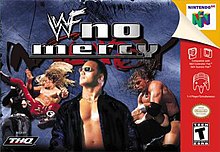WWF No Mercy
| WWF No Mercy | |
|---|---|

|
|
| Developer(s) |
Asmik Ace Entertainment AKI Corporation |
| Publisher(s) | THQ |
| Distributor(s) | JAKKS Interactive |
| Director(s) | Hideyuki Iwashita |
| Designer(s) | Kenji Kimura |
| Programmer(s) | Kudou Masaaki |
| Composer(s) | Kouji Niikura |
| Platform(s) | Nintendo 64 |
| Release | |
| Genre(s) |
Fighting Sports |
| Mode(s) | Single player, multiplayer |
| Aggregate scores | |
|---|---|
| Aggregator | Score |
| GameRankings | 85.27% |
| Metacritic | 89/100 |
| Review scores | |
| Publication | Score |
| EGM | 8.17/10 |
| Game Informer | 9.5/10 |
| GamePro | |
| Game Revolution | B+ |
| GameSpot | 7.7/10 |
| IGN | 9/10 |
| Nintendo Power | 7.3/10 |
| X-Play | |
WWF No Mercy is a professional wrestling video game released in 2000 on the Nintendo 64 console and published by THQ. It is named after the World Wrestling Federation annual pay-per-view event of the same name. No Mercy is the follow-up to 1999's WWF WrestleMania 2000, and the last WWF game released for the Nintendo 64. No Mercy was well received by players and critics alike.
Some of the features included in WrestleMania 2000 were removed from No Mercy. First, wrestlers' entrances were cut short to showing the wrestler only appear on the stage/entrance ramp, and players never see wrestlers actually enter the ring (despite early screen shots showing full ring entrances). For example, Triple H is shown spitting water at the crowd upon entering the ring. The belt options were also changed; rather than creating a belt from scratch, players now have to complete a story mode to win a title.
However, No Mercy features a much more extensive Create-a-Wrestler mode with more moves, more customizable body attributes, better-organized clothing options (No Mercy utilizes descriptive categories and titles for each clothing item, whereas WrestleMania 2000 simply numbers items), and the ability to create female wrestlers, which is nearly impossible in WrestleMania 2000. Each wrestler in the game has four different ring attires that could be independently edited, and each attire can be completely changed including name, height and weight, body parts, and music, technically allowing four different wrestlers per slot, although they must share a common moveset. Several of the game's unlockable wrestlers used this feature, such as Taka Michinoku who has his partner Funaki in two attire slots. The graphics also were improved significantly over the game's predecessor, and various match types made their Nintendo 64 debut in this game, including ladder matches and special referee matches. The game also marked the first time on the system in a WWF game that players could fight backstage and also the first time moves can be done on the announcer's table. Many parts of the backstage environment are usable, such as being able to hit the opponent with a pool stick and driving them through the pool table in the bar/lounge.
...
Wikipedia
